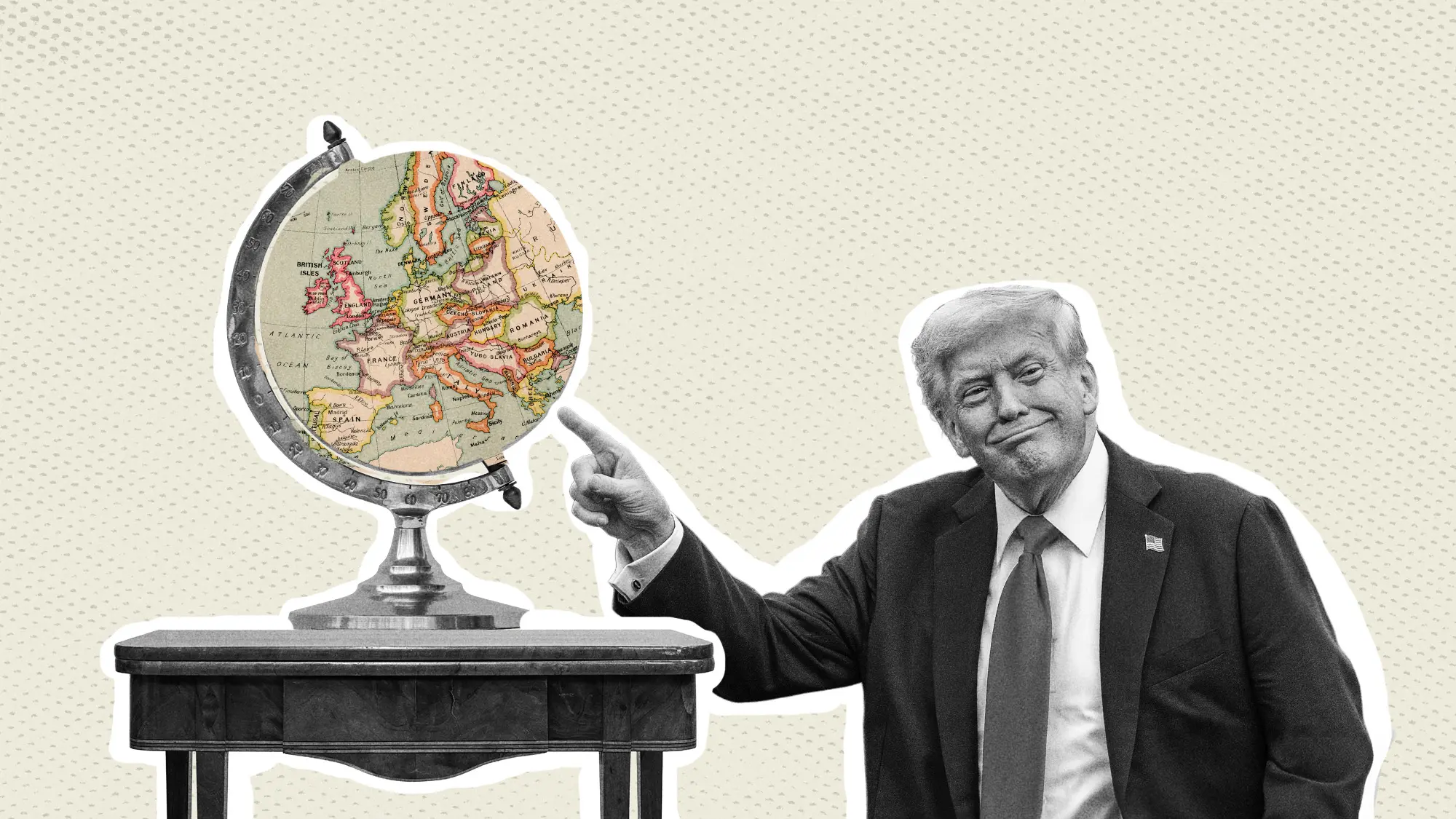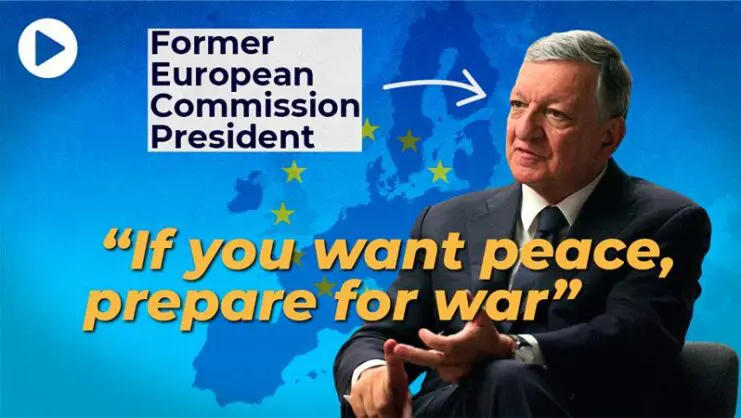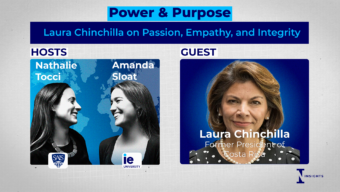“What happens in Vegas stays in Vegas.” If you have ever visited the “Entertainment Capital of the World,” you’ve likely uttered this quote after a night of revelry – and the next morning, you probably remembered that hangovers are not cured by thoughts.
Like hangovers, geopolitical tension cannot be soothed with words alone. And unfortunately, as the European Policy Centre’s Paul Taylor notes, “What happens in America does not stay in America.”
The second administration of Donald Trump is both a product and engine of democratic backsliding. In political science, democratic backsliding refers to the undermining of institutions and practices that ensure that everybody is held to the same rules. When nations undergo democratic backsliding, they do not magically convert into dictatorships overnight. Instead, regimes slowly restrict citizens’ influence by flouting traditional checks and balances. It’s a process, not an event, one that political scientists qualify by measuring the fairness of elections, public trust in institutions, the extent and robustness of public participation in the democratic process, and inequality. Each of these measures, which safeguard democracy from the daily news to the ballot box, are on the decline in the United States.
The United States is hardly alone in its democratic backsliding. The V-Dem Institute reports that, since 2010, more regimes have undergone backsliding than democratization. In other words, more nations are becoming dictatorial than democratic. Some have compared the trend to the previous “waves” that preceded World War II and the height of the Cold War.
Democratic backsliding is a complicated process, so we cannot blame it on any one factor alone. Nevertheless, digital platforms play an outsized role in each measure because they have made it easier for bad actors to spread misinformation and undermine trust in democratic institutions. In the United States, coordinated misinformation campaigns contributed to a conspiracy theory that Joe Biden stole the election in 2020, inspiring thousands of Americans to storm the Capitol building on January 6, 2021. Runaway data collection enables politicians to target specific demographics with advertisements, a feature exploited by Cambridge Analytica on behalf of the far-right in the United Kingdom to swing the Brexit referendum. The same data economies also make it easier for autocracies to interfere in democratic elections, a weapon recently wielded by Russia during elections in Moldova, Georgia, and Romania.
The Trump administration is determined to spread the wave of democratic backsliding to Europe. This ambition is clearly set forth in efforts to subvert the European Union’s tech regulations. Earlier this year, Apple and Meta (the U.S. firm that owns Facebook, Instagram, WhatsApp, and other platforms) came under investigation for suspected violations of the Digital Services Act (DSA) and Digital Markets Act (DMA). Facebook’s “pay or consent” model, which forces users to pay a fee or consent to data tracking, is a clear-cut violation of the DMA’s antitrust rules. In response, Trump took to Truth Social to threaten additional tariffs, just a few weeks after closing a trade deal in which the EU acceded to a 15% tariff on European goods and increased European investments in U.S. energy and weapons.
Fortunately, Brussels has resisted Trump’s attempt to bully the EU into submission, with European Commission spokesperson Paula Pinho asserting that the EU will retain its “sovereign right” to regulate platforms’ economic activities.
The MAGA machine is determined to enforce the American style of tech regulation upon Europe.
However, the European Union does not always act so quickly to stand behind its values. Since Elon Musk’s purchase of Twitter, the EU has investigated the platform for various violations of the DSA, including the spread of violent content, refusal to provide data to researchers, and non-transparency around advertising. In 2024, investigators found violations on all counts. The European Commission reached out to X to share its results and urge the platform to remedy its problems, which it has not done, per Musk’s admission. Despite continued non-compliance, the EU has yet to impose a fine on X, despite rumors circulating since April 2025.
Why has the Commission taken a cautious approach? Unlike Meta CEO Mark Zuckerberg and Apple CEO Tim Cook, X CEO Elon Musk can leverage his enormous public profile as a “defender of free speech.” What’s more, Musk has been a close Trump ally, having served in the administration’s cost-cutting “Department of Government Efficiency.” As tech columnist Eliza Gkritsi has suggested, the X case could snowball from a legal controversy into a political one, emboldening reaction against the EU’s regulatory regime on both sides of the Atlantic.
The enforcement of the DSA promises to remain a sticking point in EU-US relations. In a February 2025 memorandum, Trump promised that the DMA and DSA “will face Scrutiny” as the “Administration will consider responsive actions like tariffs to combat the digital service taxes… that foreign governments levy on American companies.” In other words, the more that the EU exercises its right to enforce the DMA and DSA on the European activities of U.S. tech companies, the more likely Trump will up the ante on tariffs, weapons spending, support for Ukraine, and other key issues.
In his speech to the Munich Security Conference in February 2025, U.S. Vice President J.D. Vance mocked this grave situation. He joked, “If American democracy can survive ten years of Greta Thunberg’s scolding, you guys can survive a few months of Elon Musk.” This argument is not just glib; it is a false equivalency. Whereas Greta Thunberg is merely one private citizen expressing her opinion, Elon Musk is the richest man in the world who purchased a digital platform, gutted its Trust & Safety team, and infused it with an AI chatbot that outputs content glorifying Adolf Hitler. More recently, Musk used the platform to amplify misinformation in support of Germany’s far-right AfD party, flexing his capacity to interfere in European democratic elections. While Thunberg has no power to enforce her private opinions on the American people, the MAGA machine is determined to enforce the American style of tech regulation upon Europe, despite Thierry Breton’s bold 2022 rejoinder: “In Europe, the bird will fly by our rules.”
J.D. Vance makes light of this situation because he, and the political movement that he represents, does not respect the fact that Europe has chosen a different path than the United States when it comes to regulating tech. In her book Digital Empires, legal expert Anu Bradford contrasts three different global approaches to regulating technology: The American “market-driven model,” the Chinese “state-driven model,” and the European “rights-driven model.” The European model is unique in that it emphasizes the collective rights of European citizens and deeply involves civil society organizations, not just governments and corporations, in the regulatory process.
American critics of the EU cannot tell the difference between the European and Chinese models because, in American politics, human rights are conceived in strictly individual terms. When American politicians consider how platforms affect freedom of speech, they are mainly concerned with ensuring that each individual faces no consequences for what they post online. Any efforts by governments to foster a healthy information ecosystem, to safeguard data privacy, or to promote nondiscrimination and solidarity registers to the market-driven mind as a form of democratic backsliding.
In contrast, European conceptions of free speech are concerned with balancing individual expression with the collective responsibility to foster a healthy environment marked by equal access to reliable information. Perhaps Europe’s long memory of democratic backsliding equips it with the political will to think in collective terms. As the great philosopher Jürgen Habermas suggests in The Crisis of the European Union, “Within the vast territories of our nation states, the floating horizon of a shared political life-world … always had to be produced and maintained by mass media.” In other words, the very idea of European political identity depends on fostering a media ecosystem which balances individual and collective rights – a media ecosystem which Trump and his allies want to destroy.
European tech regulations are not perfect. Anyone who has clicked through a few GDPR-compliant privacy consent boxes can attest to that. On a more serious point, critics argue that the EU’s regulatory regime undercuts innovation. Nevertheless, European tech regulations reflect Europe’s unique political sensibility: a sense of collective responsibility that is not reducible to either the individual or the state. Accordingly, the Eurobarometer reports that European public opinion is strongly in favor of the EU’s rights-driven regulations. Respecting democracy means upholding Europe’s regulatory model, a reflection of Europe’s identity as a force for progress that leaves no one behind.
Despite himself, Vance accidentally showed MAGA’s hand. Like Musk using his wealth to subvert Twitter, the United States is attempting to leverage its coffers, weapons, tariffs, and far-right European allies to subvert the EU’s rights-based regulatory regime. The only question is whether, like Twitter’s shareholders, the European Union will let itself be bullied into betraying its citizens’ choices, values, and identity.
A bold response will certainly include enforcement of the DSA and DMA, but must go further. European institutions must de-risk from the United States, build their own clean tech, and foster alliances with like-minded democracies. And it must act before, not after, another crisis ensues. After all, cutting a deal with Trump is like betting against the house in Las Vegas: The only winning move is not to play.
© IE Insights.











